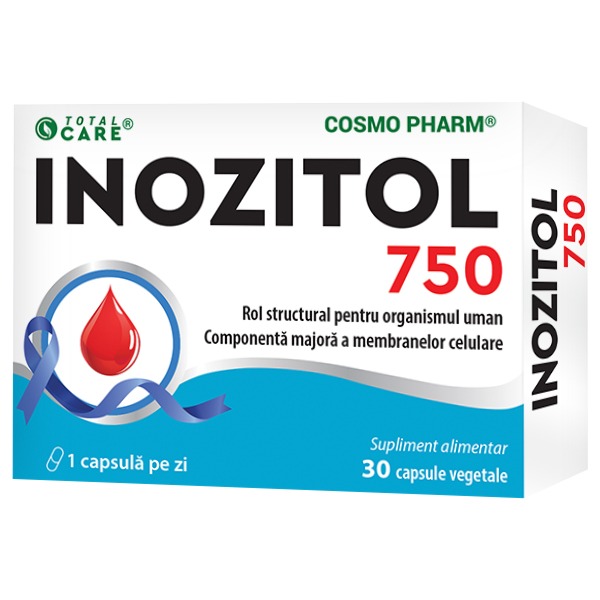Diabetes is a chronic condition that impacts the lives of millions of people worldwide, being one of the leading risk factors for heart and kidney diseases, blindness, and amputations. Without proper management, it can lead to a series of serious complications and significantly affect the quality of life.
In this context, inositol stands out as a potential ally in the fight against diabetes. Known as Vitamin B8, inositol is a natural substance that regulates cellular processes and can have a positive impact on managing diabetes and its complications.
What Role Does Inositol Play in Diabetes?
Inositol plays a crucial role in improving insulin sensitivity and managing blood sugar levels, contributing to the prevention of diabetic complications.
Inositol, also known as Vitamin B8, is an organic compound from the polyol class and is considered a member of the B-vitamin complex. It can be produced endogenously in the human body and can also be obtained from certain foods.
Inositol is significantly present in the cell membrane, where it contributes to the regulation of many biological processes.
Main Roles and Functions of Inositol
Inositol has a significant impact on managing and preventing diabetes due to its vital roles in regulating insulin and cellular function. Here are some of the main roles and functions of inositol:
- Cellular Signaling Transmission: Inositol plays an essential role in cellular signaling, being involved in various cellular functions, including growth and differentiation.
- Improving Insulin Sensitivity: Inositol facilitates the action of insulin and can help improve cellular sensitivity to insulin. It can reduce insulin resistance, a key factor in type 2 diabetes, and help control blood sugar. Inositol affects how the body uses glucose and participates in the transport of glucose into cells. It can help maintain normal blood sugar levels and prevent long-term diabetic complications.
- Managing Diabetic Complications: It helps prevent and manage diabetic complications, such as diabetic neuropathy. It can reduce symptoms and improve the quality of life for people with diabetes.
- Brain Health: Inositol contributes to the regulation of neurotransmitters and is essential for brain health, playing a role in reducing anxiety and improving mental well-being.
- Lipid Metabolism: It is involved in lipid metabolism and insulin management, being essential for metabolic health.
- Fertility: Inositol is studied for its role in improving fertility and alleviating polycystic ovary syndrome (PCOS).
- Cellular Structure: It contributes to the structural integrity of cell membranes, impacting cell function and organ health.
What is Diabetes?

- Type 1 Diabetes: This is an autoimmune form of diabetes in which the body attacks the beta cells that produce insulin. It is more common in children and young adults.
- Type 2 Diabetes: This is the most common type and is often associated with obesity, an unhealthy lifestyle, and genetic predisposition.
- Gestational Diabetes: This occurs during pregnancy and can increase the risk of complications during childbirth and the development of type 2 diabetes later in life.
Symptoms, Causes, and Complications
Diabetes symptoms can vary depending on the type of diabetes and blood sugar levels. However, common symptoms include:
- Excessive Thirst: Polydipsia, or constant thirst, is a common symptom of diabetes.
- Frequent Urination: Polyuria, or excessive urination, occurs when the body tries to eliminate excess sugar through urine.
- Fatigue: Energy is produced by glucose, and diabetes affects how the body uses glucose.
- Unintended Weight Loss: Especially in Type 1 diabetes.
- Blurred Vision: High blood sugar levels can affect the blood vessels in the eyes.
- Frequent Infections: The immune system is affected, increasing susceptibility to infections.
- Slow Healing of Wounds: Poor circulation and nerve damage can affect the healing process.
- Darkened Skin (Acanthosis Nigricans): Typically found in areas with skin folds, such as the neck or armpits, and is associated with insulin resistance.
The causes of diabetes vary depending on genetics, environmental factors, and lifestyle.
- Type 1 Diabetes: Caused by autoimmune destruction of the pancreatic beta cells.
- Type 2 Diabetes: Insulin resistance and relative insulin insufficiency, influenced by genetic factors, lifestyle, and obesity.
- Gestational Diabetes: Caused by insulin insufficiency during pregnancy.
Untreated or poorly managed diabetes can lead to severe complications, including:
- Cardiovascular Diseases: Heart attack, stroke, and arteriosclerosis.
- Diabetic Neuropathy: Nerve damage, which can cause pain and tingling sensations.
- Diabetic Retinopathy and Vision Problems: Damage to the blood vessels in the retina can lead to blindness.
- Diabetic Nephropathy: Kidney damage, which can lead to kidney failure.
- Skin Infections: More common in people with diabetes and can become severe.
- Amputations: Poor circulation and non-healing wounds may require limb amputations.
- Mental Health Problems: Depression, anxiety, and eating disorders are more common in people with diabetes.
Studies
A clinical study examined the effects of inositol on women with gestational diabetes. The results showed improved insulin sensitivity and a reduction in the need for insulin in the group that received inositol supplementation.
Some studies have shown that inositol may improve blood glucose management and reduce insulin resistance.
Many studies have demonstrated that inositol can be beneficial in reducing insulin resistance, a common issue in Type 2 diabetes. It may be especially useful for patients with polycystic ovary syndrome (PCOS), who often present insulin resistance.
Who Can Take Inositol?

- People with PCOS: People with polycystic ovary syndrome may benefit from inositol due to its ability to improve insulin sensitivity.
- People with Diabetes: People with diabetes or insulin resistance may also benefit from inositol, as it can help manage blood sugar levels.
- People with Anxiety or Depression: Research suggests that inositol may have positive effects on mood disorders, such as anxiety and depression.
Who Should Avoid Inositol?
- Pregnant or Breastfeeding Women: Although inositol has been studied in the context of gestational diabetes, pregnant or breastfeeding women should consult with a doctor before starting inositol supplementation.
- People with Kidney or Liver Conditions: People with severe kidney or liver conditions should approach inositol supplementation with caution and consult with a doctor before starting such a regimen.
- People with Bipolar Disorder: There is some evidence suggesting that inositol may trigger manic episodes in people with bipolar disorder, so it is recommended to avoid it in these cases.
Sources of Inositol
Inositol can be consumed in different forms and is available as a dietary supplement. It can be found in many foods, but the quantities present in food are generally much smaller than the doses used in clinical studies. Here are some ways to consume inositol:
- Supplements:
- Capsules: Inositol is often available in capsule form, such as Inositol 750 from COSMO PHARM®, which allows for precise dosage control.
- Powder: Inositol can also be available in powder form. It can be mixed with water or other liquids and may sometimes be easier to take in higher doses.
- Foods: Although not providing inositol in quantities comparable to supplements, certain foods are good natural sources of inositol. These include:
- Citrus fruits and kiwi
- Whole grains and seeds
- Legumes (such as beans and lentils)
- Nuts and seeds
Why Choose Inositol 750 from COSMO PHARM®?
Inositol 750 from COSMO PHARM® provides a concentrated dose of inositol, extracted from natural sources, ensuring a potent dose and potential health benefits. Prepared with high purity and quality standards, this formula is allergen-free, without titanium dioxide, excipients, or preservatives, providing a natural and safe product for consumers. The vegan-friendly vegetable capsules are easy to take, making them a convenient option for many people. It can be used for various conditions such as diabetes, dyslipidemia, fertility issues, PCOS, and mood disorders such as depression and anxiety.
Inositol 750 from COSMO PHARM® may be a suitable choice for a wide range of people due to its multiple and diverse benefits, affordable price, and concentrated, natural formula. However, it is always advisable to consult with a doctor or healthcare professional before starting any new supplement, especially in the presence of pre-existing medical conditions or when taking other medications or supplements.
Inositol, or Vitamin B8, can play a significant role in managing and preventing diabetes and its complications due to its ability to improve insulin sensitivity and influence many other cellular and metabolic processes.
Before starting inositol supplementation, it is important to consult a doctor, especially for people with pre-existing health conditions or for those taking medications.

